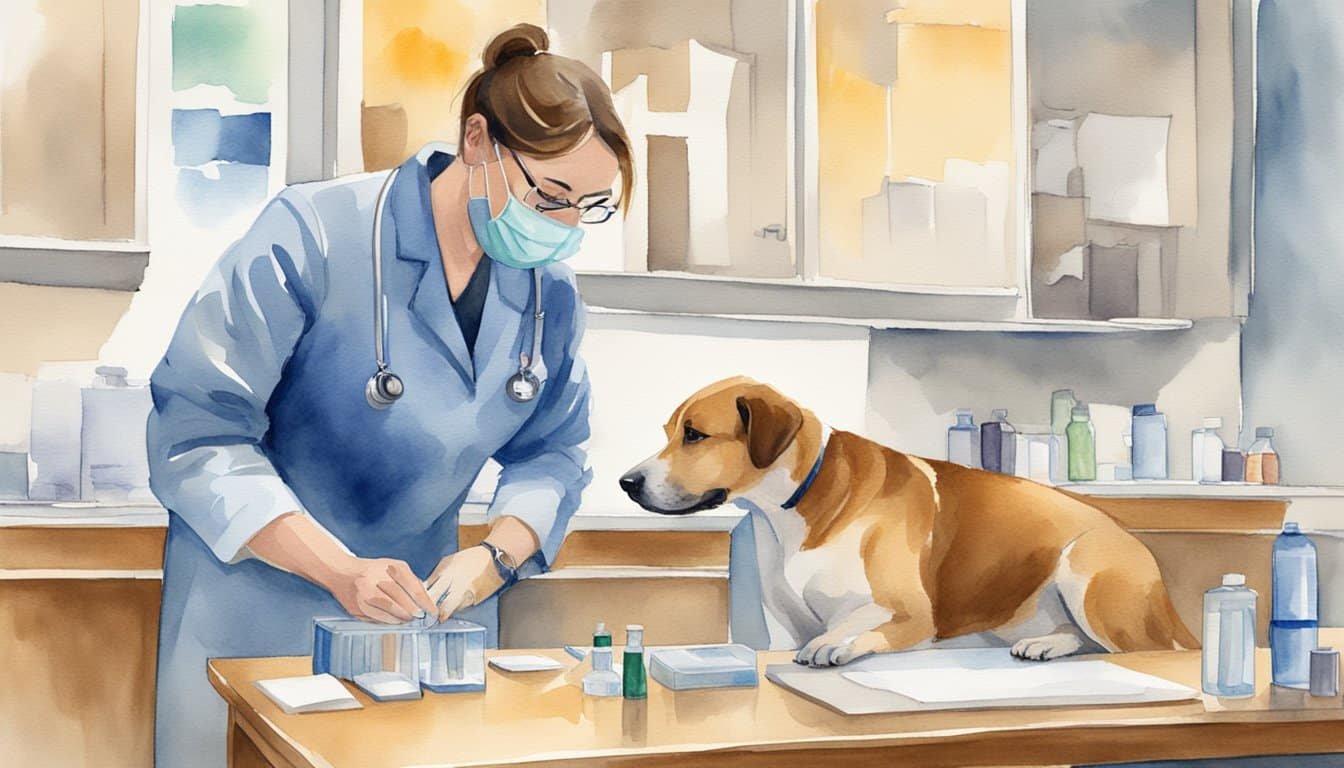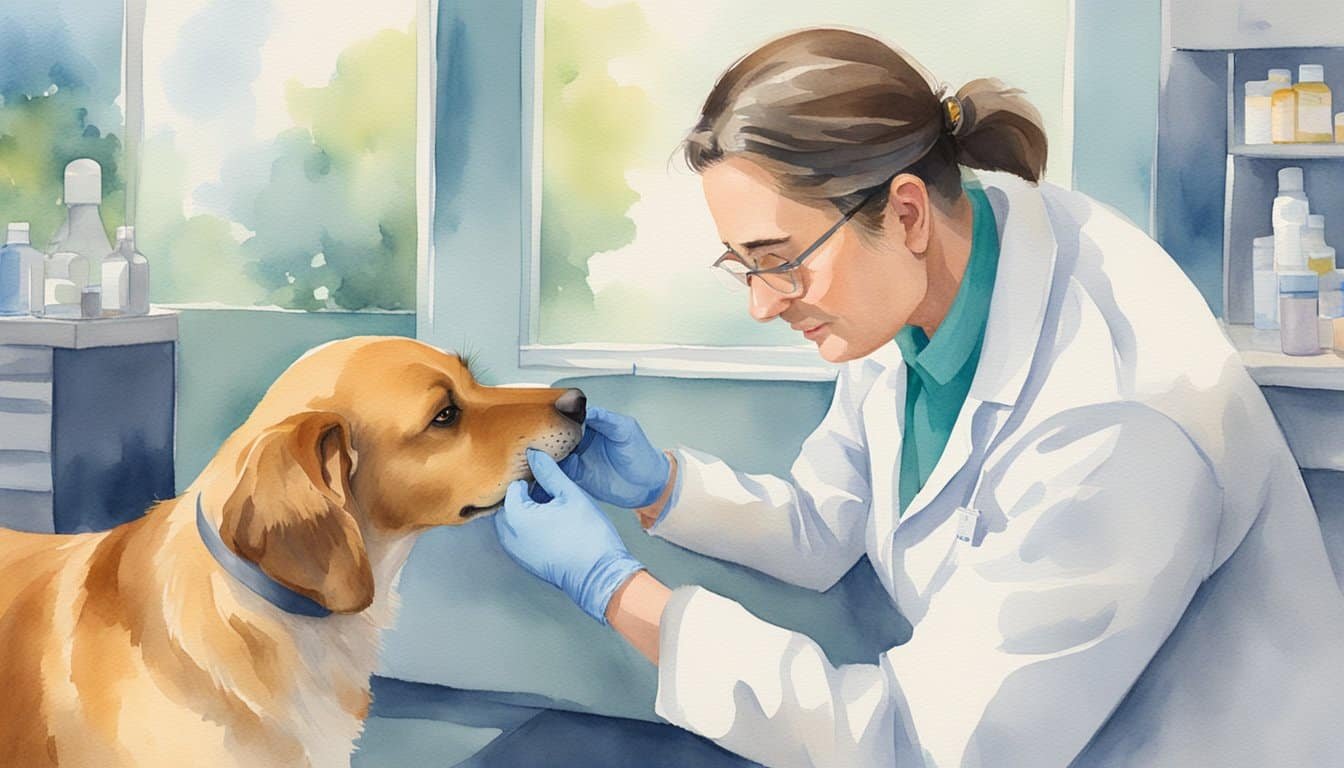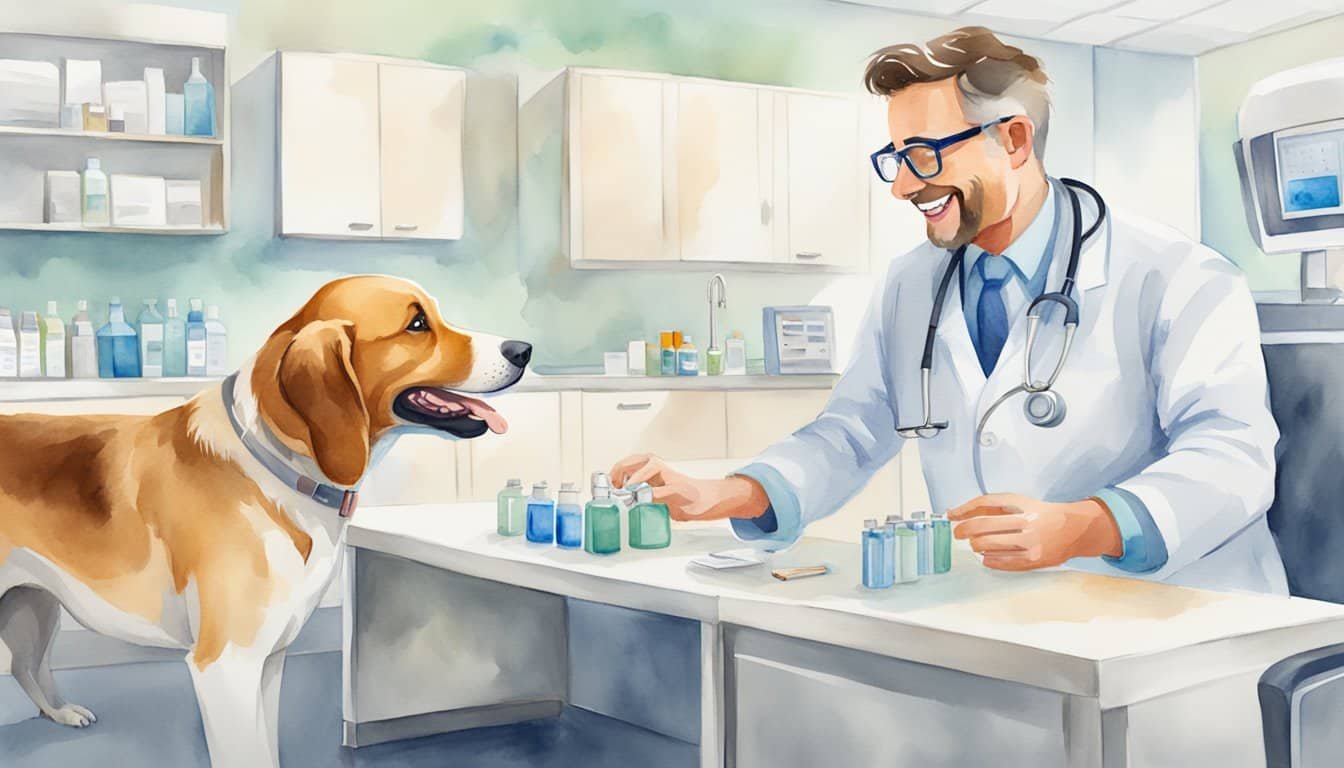Understanding Dog Allergies
When a person’s immune system overreacts to proteins in dog dander, saliva, or urine, they experience dog allergies. This allergy can lead to various symptoms that affect a person’s quality of life.
Identifying Common Symptoms
Allergic reactions to dogs can present through several symptoms, typically involving the skin or respiratory system. Some people may experience sneezing, runny or stuffy nose, or itchy and watery eyes. Skin allergies like dermatitis are also common and manifest as red, itchy skin. Occasionally, dog allergies might cause more severe reactions, such as asthma attacks in people with asthma or skin infections from excessive scratching.
Types of Allergen Exposure
There are several ways an individual can be exposed to dog allergens. Environmental allergies involve dander, the dead skin cells shed by dogs, which is a common allergy trigger. Other potential allergens include proteins found in a dog’s saliva and urine, which can cling to clothing, furniture, and carpets. While less common than environmental triggers, some individuals also suffer from food allergies related to dog food ingredients when they are directly or indirectly exposed. Additionally, fleas from dogs can cause allergic reactions, not only because of their bites but also through flea dirt or dead fleas left in the environment.
While dog allergies mainly arise from exposure to the animals themselves, it’s worth noting that allergies can be compounded by factors like pollen, mites, or grass that dogs might carry into the home on their fur or paws, making it important to consider all environmental factors to properly manage allergic reactions.
Allergy Diagnosis and Management

Before subjecting their furry friends to allergy shots, dog owners should be aware that precise allergy diagnosis and effective management are paramount. Identifying the specific allergens is key, followed by choosing the right treatment to alleviate the symptoms and making home adjustments to help the pet stay comfortable.
Allergy Testing Methods
Allergy skin test: A veterinarian or a veterinary dermatologist may recommend this test, where a small amount of various allergens is introduced into the dog’s skin. If there’s swelling or redness, typically within 20 minutes, it suggests an allergy to that particular substance. This procedure is excellent for identifying culprits like pollen, dust, or flea allergies.
Blood test: Sometimes, a blood test is used to detect allergens. Blood tests are less invasive and can be administered outside the traditional veterinary clinic setting. They measure the amount of allergy-causing antibodies in the dog’s bloodstream, a technique that works for numerous potential allergens.
Available Treatments and Medications
Once allergies are confirmed, relief can often be delivered through an array of prescription medications:
- Antihistamines can reduce inflammation and are particularly useful for mild allergy symptoms.
- For more severe cases, steroids may be prescribed to lessen symptoms, but long-term use can have side effects.
- Allergy shots (immunotherapy) offer a longer-term solution by gradually desensitizing the dog’s immune system to the allergens.
Mitigating Allergy Symptoms at Home
To assist in providing relief at home, consider the following:
- Regular bathing with hypoallergenic shampoos can remove allergens from the fur.
- Implement flea control to prevent flea allergy dermatitis.
- Managing the dog’s environment by using air purifiers can lessen airborne allergens.
- Nasal irrigation with saline solutions can help with respiratory symptoms associated with pet allergies.
Each of these steps contributes to the overall therapy plan for a dog’s allergies and can significantly enhance the quality of life for both the pet and its owners.
In-Depth Allergy Shots

Allergy shots for dogs, also known as immunotherapy, offer a promising avenue for reducing allergen-induced discomfort. These injections can lead to a significant decrease in symptoms such as itching and redness.
How Allergy Shots Work
Immunotherapy in dogs involves regular injections that contain tiny amounts of the allergens that trigger their reactions. Essentially, these allergy shots work by gradually desensitizing the dog’s immune system. Over time, the immune response to these allergens diminishes, often resulting in a decrease of allergic symptoms like itching.
Cost and Duration of Treatment
- Cost of allergy shots: The expense can vary widely depending on several factors, including the allergens involved, geographic location, and whether pet insurance covers the treatment.
- Initial allergen testing and formulation of the serum can cost several hundred dollars.
- Ongoing injections may range from $1 to $3 per shot.
The duration of treatment is often long-term, with initial frequent injections that transition to maintenance shots typically given every few weeks. Owners should consider this a multi-year commitment to achieve the best results.
Potential Side Effects and Risks
While allergy shots are generally considered safe, they do have potential side effects and risks. Commonly, dogs might experience mild reactions at the injection site, such as:
- A small bump or swelling
- Mild discomfort
Rarely, more severe allergic reactions could occur, necessitating immediate veterinary attention. Other treatments like Apoquel and Cytopoint for dogs might be suggested as alternatives or adjuncts to manage allergies more effectively with fewer risks.
Advancements in Allergy Treatment

Recent years have seen exciting progress in allergy treatment options for dogs. From precise biological therapies to promising developments on the horizon, managing canine allergies has become more sophisticated and targeted.
Biological Therapies
Biological therapies, such as monoclonal antibodies, signify a breakthrough in treating dog allergies. One such therapy is lokivetmab, an innovative drug designed to target and neutralize interleukin-31, a key itch-inducing cytokine. Critically, this means that dogs suffering from atopic dermatitis—an allergy-driven skin condition—can now experience relief from constant itching without the side effects common to traditional steroids.
Lokivetmab injections, administered once a month, have proven effective for many dogs. However, these therapies are part of a larger treatment plan, which may still include allergen-specific immunotherapy (ASIT). ASIT exposes a dog’s immune system to small amounts of allergens over time, intending to build tolerance or eliminate hypersensitivity.
The Future of Canine Allergy Management
Looking forward, the future of dog allergy treatment is promising, with ongoing research into novel biological treatments and more refined immunotherapy protocols. Researchers are investigating different pathways that cause allergic reactions in dogs, and new treatments will likely target these pathways more precisely to prevent allergic symptoms.
Additionally, advancements in diagnostic tools will continue to enable veterinarians to tailor immunotherapy treatments to individual dogs’ needs, making allergen-specific immunotherapy even more effective. The ultimate goal is to move beyond symptom management toward complete tolerance to allergens, enhancing the quality of life for our four-legged friends.
Caring for a Dog with Allergies

When a dog is diagnosed with allergies, pet parents are faced with the challenge of managing their furry friend’s symptoms. A multi-faceted approach can keep a pet comfortable and healthy.
Daily Management Strategies
Itch relief: Itching is a common and frustrating symptom of allergies in dogs. Implementing a combination of allergy medicine and changes to the diet is key. Omega-3 and -6 fatty acids, found in certain foods and supplements, can support skin health and reduce itchiness.
Environmental control: Regularly wash bedding and use air purifiers to decrease airborne allergens. Limiting exposure to known allergens can help prevent flare-ups.
Prescription medication: For some dogs, over-the-counter options may not suffice. Prescription medications like Atopica (cyclosporine) can be safe for dogs and effective in controlling symptoms. Always follow a veterinarian’s dosage instructions carefully to ensure pet health.
Consulting with a Veterinary Dermatologist
A specialist can provide valuable insight for diagnosing and treating a dog with allergies. After thorough testing, a veterinary dermatologist may recommend immunotherapy—a targeted allergy “shot” that gradually conditions the dog’s immune system to be less reactive to allergens.
Preventive care: Along with treatment, a dermatologist can suggest preventive measures, including flea prevention and hypoallergenic diets, which might alleviate allergy symptoms.
Managing allergies in dogs requires patience and diligence, but with the right strategies and support from a vet, pet parents can help their canines live a comfortable and happy life.

